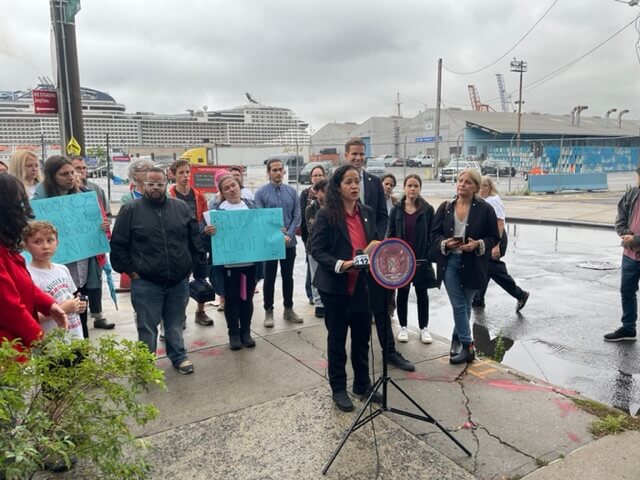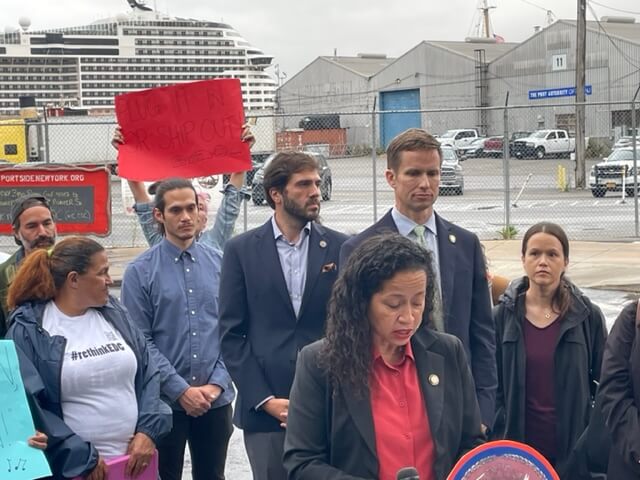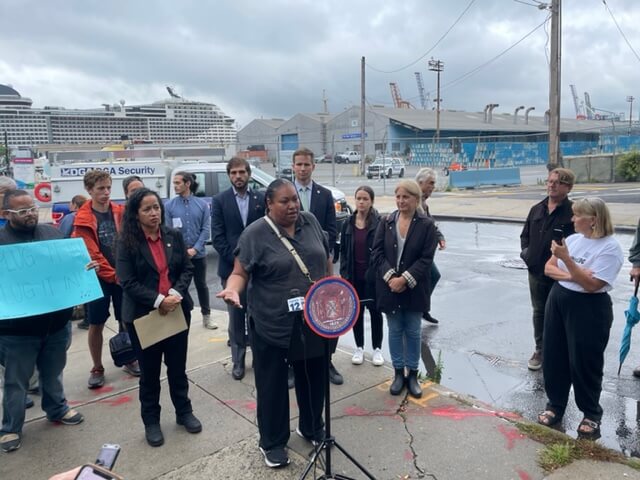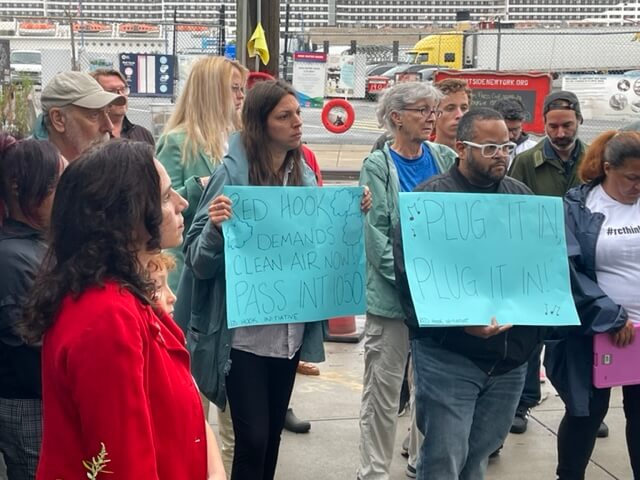Red Hook residents joined politicians in a protest against cruise ship pollution on September 18. Council member Alexa Aviles led the way along with fellow politicians Erik Bottcher, Marcela Mitaynes, and Antonio Reynoso.
Aviles is a cosponsor of Intro 1050 which “requires the use of shore power by cruise terminal operators and community traffic mitigation plans in neighborhoods impacted by cruise ships at berth.” This bill would also require cruise operators to provide a community traffic mitigation plan. These plans would outline measures to reduce traffic, noise, and pollution from ships when they dock.

Shore power uses electricity to power the ships while in port. $20 million was spent to bring it to Red Hook, but it is rarely used.
“We’re here with dedicated advocates and residents who have been banging this drum long before I got into office,” Aviles said. “It’s pressure from Carolina Salguero of PortSide New York, resident Adam Armstrong, the old and the new Civic Association, and countless other residents who have brought us to this moment.

One of the Red Hook residents who is frustrated by the cruise ships is nine-year-old Hart Valentine who complains of asthma.
A Star-Revue asthma study earlier this year found that increased asthma rates in Red Hook are caused by a variety of indoor factors including mold and pests along with outdoor factors like pollution from trucks and cruise ships, as well as other factors including stress and anxiety. It is clear that together all of these factors are contributing to the problem.
“Over the summer we convened a group of local stakeholders to address the cascading impacts of having this mega cruise liner here in our community,” Aviles said. “This included addressing traffic congestion, trash, and the economic consequences of dealing with an issue that our community was fully excluded from. We were never asked. We were never engaged and no benefit of this transaction has ever hit our community. In fact, it has been a wholly extractive deal.”

On September 28, the Economic Development Corporation (EDC) announced agreements with cruise companies including MSC Cruises, Princess Cruises, Carnival Cruises, and many more to sail from Red Hook’s cruise terminal. The City touted the economic benefits of the deal with the cruise companies but the deal makes it even more important for the cruise ships to use shore power.
As mentioned, the Cruise Terminal is equipped with shore power, but many ships are either incompatible with the design or simply don’t plug in because they are not required to do so.
There are a variety of ways in which the cruise companies are supposed to make sure they are helping the communities where they will spend time (like Red Hook) including plugging in and using shore power as well as establishing a community priority fund.
The companies are supposed to submit an annual report to EDC on their progress regarding community benefits. However, it is unclear if there is any real enforcement.
We reached out to Aviles’ office, who promptly responded with the following statement:
“Despite looking like we are headed in the right direction, there’s a lot we still don’t know. We’re waiting on EDC to announce a more detailed plan outlining all of the dimensions of the agreement. We are still awaiting specifics regarding how and when we will get to 100 percent usage of shore power at the Brooklyn Cruise Terminal, and what the actual plan is for outfitting Manhattan with shore power.

“We also would like to see more specifics on how any of these ‘benefits’ will actually mitigate current conditions in Red Hook, or if any of this will truly benefit the local community. Unfortunately, the agreements that EDC has entered into, once again, lack substantive community engagement. At a minimum, EDC’s timelines for plug-in completion are wholly unacceptable given that our communities suffer from toxic exhaust generated not only by the cruise liners but all the associated trucks and cars they bring, in addition to the unregulated last-mile industry that is swallowing our neighborhoods.
“Every day that a ship doesn’t plug in means tons of toxic chemicals that pollute our homes, our playgrounds, and our streets. Every day that a cruise operator doesn’t consider traffic mitigation means that our neighbors can’t get to work, emergency vehicles can’t get through, and we are presented with a risk to our safety. The City must consider the health impacts on our communities first and foremost. Our health and well-being should never be viewed as a cost of doing business.”









